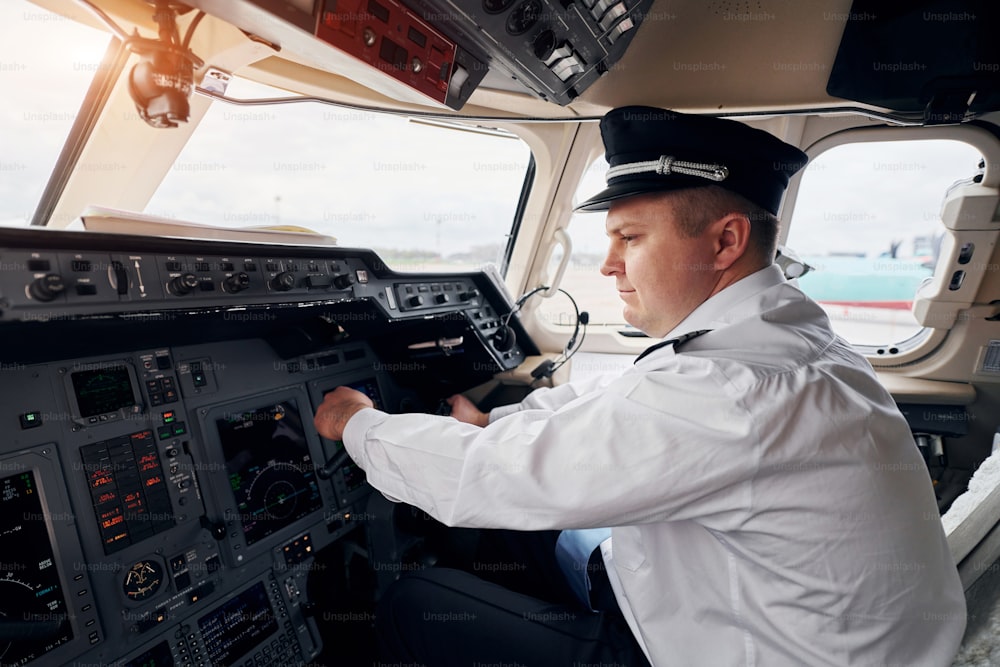HOW TO BECOME A PILOT | WHAT MEANS OF PILOT ?
7 min readHOW TO BECOME A PILOT | WHAT MEANS OF PILOT ?
Ready for Takeoff and Soaring to New Heights: How to Become a Pilot?

A pilot is a professional who flies and navigates aircraft, fighter jet,
helicopters and other aircraft types. They operate the flying controls while
ensuring the safety of the crew and passengers. As a pilot, you could transport
passengers or goods from one place to another or you could work with a company
offering charter flights, aerial photography and rescue operation.
In India,
pilots can work in diverse fields, such as commercial aviation and the air
force. Apart from ensuring safe travel by flying the plane as per norms, pilots
also conduct different pre-flight checks. These checks include checking the
weather, performing flight safety checks, updating flight logs and confirming
flight plans.
Aviationfly has helped many aspiring pilots just like you become a pilot with our How to become a Pilot in India 2023 Guide. In this page, we will walk you through all the steps that you need to take into consideration when pursuing your dream of becoming either a private pilot, commercial pilot, or airline transport pilot.
How to become a pilot in India
Follow these seven steps to become a pilot in India:
1. Do your research
In India, there are two ways of becoming a pilot. One way is through civil aviation and the other is through Indian Defence Forces. The first path leads you to become a commercial pilot, whereas the second path makes you an air force pilot. So, conduct in-depth research before you embark upon your pilot career. Each path requires different eligibility criteria. However, both career paths require you to pass exams and clear medical examinations.
2. Choose between commercial or air force pilot
The requirements, responsibilities, licence requirements and benefits are different for commercial and air force pilots:
Civil aviation pilot
Commercial pilots fly aircraft and helicopter for business purposes. As a commercial pilot, your job may entail flying passenger or cargo aircraft. You may also help during rescue or evacuation operations and traffic monitoring. To be eligible for becoming a commercial pilot, you must have a Higher Secondary Certificate (HSC) with mathematics and physics as mandatory subjects. If you do not possess that certificate, you can complete a course on these two subjects from an open school.
Air force or fighter pilot
If you are passionate about serving our nation, you can opt to become an air force or a fighter pilot. If you get selected, you will be able to fly aircraft such as bombers, future strategic tanker aircraft (FSTA), fighter jets and transport planes for the Indian Defence Forces. You can begin your career as a fighter pilot after passing your HSC or after completing your graduation with additional requirements.
3. Join a flying school
If you decide to become a civil aviation pilot, you need to join a flying or a training school. Research and evaluate different flying schools in your city or around the country. Understand their fee structure and duration. Such schools offer different courses based on your age, experience and requirement. These training schools provide flight training along with classroom lectures to hone your piloting skills further.
4. Apply for a licence
The Directorate General of Civil Aviation (DGCA) issues and regulates licenses for civil aviation pilots in India. To become a civil aviation pilot, you must complete a minimum number of hours of flight experience as per DGCA rules. You will also have to take written and oral examinations apart from showcasing your flying ability.
Based on your experience, age and flying hours, you may apply for students pilot licence (SPL), commercial pilot licence (CPL), private pilot licence (PPL) and airline transport pilot licence (ATPL).
-
Students pilot licence: SPL is a prerequisite for flying training and flying. To obtain an SPL, you must be above 16 years of age and have completed your senior secondary certification (SSC). No flight experience is required for obtaining an SPL. However, you must be medically fit. If you fulfil all these criteria, apply to any flying school recognised by DGCA.
-
Private Pilot licence: with a Private Pilot licence (PPL), you can fly passenger or cargo aircraft without getting paid for it. To obtain a PPL, you must be above 17 years of age and meet all SPL requirements. Unlike SPL, PPL requires you to clock certain flying hours.
-
Commercial pilot licence: CPL is mandatory for flying a commercial aircraft and becoming a professional pilot. For obtaining a CPL, you must be at least 18 years old and meet all PPL requirements. Apart from being medically fit, you must clock certain flying hours as fixed by the DGCA.
-
Airline transport pilot licence: ATPL is mandatory to fly with airlines and for obtaining this licence, ensure you are above 21 years of age. Like other licences, you have to log certain flying hours. A senior CPL licence is a must for getting an ATPL.
If you wish to become an air force pilot, you require a defence licence.
5. Clear the pilot exams
Both civil aviation and air force pilots have to clear written examinations and flying tests to earn their pilot licence.
Civil aviation pilots
-
SPL: you need to pass the oral examination conducted by the DGCA.
-
PPL: you will also have to pass a flying and written test conducted by DGCA. The written test subjects include air regulation, air navigation, aviation meteorology, aircraft and engines.
-
CPL: getting a CPL requires passing a written examination conducted by the DGCA. The subject includes air navigation, air regulation, aviation meteorology, radiotelephone, signals, aircraft and engines.
Air force pilots
-
National Defence Academy (NDA): you need to clear the NDA entrance examination, which tests your general aptitude and mathematics.
-
Combined Defence Service Examinations (CDSE): you need to give CDSE after completing your graduation. It tests you on your English, mathematics and general knowledge. After successfully passing the CDSE exam, you have to clear the SSB interview followed by a pilot aptitude test.
-
Air Force Common Admission Test (AFCAT): the Short Service Commission (SSC) conducts the test and under this path of becoming a pilot, you cannot serve for more than 14 years in the air force. The test assesses your verbal ability, reasoning, numerical ability, military aptitude and general awareness.
-
Entry through National Cadet Corps (NCC): if you are a graduate with 60% marks, a member of NCC society and holds a certificate of Air Wing Senior Division ‘C’, you are eligible to apply through NCC. Applicants who secure an ‘A’ and ‘B’ certificate need not give a written test. They are directly eligible for SSB interview.
All four paths of becoming an air force pilot require clearing of the specific examination. On passing the exam, you need to clear the SSB interview followed by the pilot aptitude test.
6. Get flying experience
As per DGCA, all civil aviation pilots have to log a certain number of flying hours to earn their licence. The flying experience depends upon the type of licence you wish to achieve. For example, an SPL licence requires no flying experience, but a CPL requires logging at least 200 flying time hours. It is essential to keep logging hours as you move in your career path. It can take more than a year or two to log the number of hours required for CPL and ATPL.
7. Get your medical examination
As a part of the pilot’s licence stipulation, you must complete a medical fitness test to ensure your health does not interfere while operating the aircraft. Both civil aviation pilots and air force pilots must clear medical examinations as per the rules laid by DGCA and Indian Defence Forces. Air force aspirants require a minimum height of 152 cm and 6/6 eye vision on one eye and 6/9 vision on the other eye. Your weight should correlate with your height. To become eligible for a DGCA licence, you require a certificate of physical fitness in compliance with the requirements of DGCA.
Average salary for pilots
Tips for becoming a pilot in India
Whether you want to become a civil aviation pilot or an air force pilot, these tips will help you become an efficient pilot:
-
Choose the right flying school: always choose a flying or training school that the DGCA recognises. Otherwise, it would become difficult to obtain the licence you require.
-
Work on your communication skills: English is the global language in the aviation sector and as a pilot, you should be fluent in your communication. From communicating with the ground staff to taking clearance before landing and take-off, communication holds the key.
-
Ensure you can handle pressure: as a pilot, you may come across high-pressure situations. So, airlines prefer people who display incredible calmness under challenging situations. If you are not calm by nature, you need to practice it.
-
Practice your mathematics: you may have to perform calculations daily and your mathematics skills come in handy when flying an aircraft.
Also Read :-
Invest In This App To Earn Big Money: How A Mangaluru Victim Was Scammed Out Of Rs 25 Lakh
From Zero to Hero: How to Build a Successful Startup in the Digital Age
How to make a new email ?| Creating a New Gmail ID



